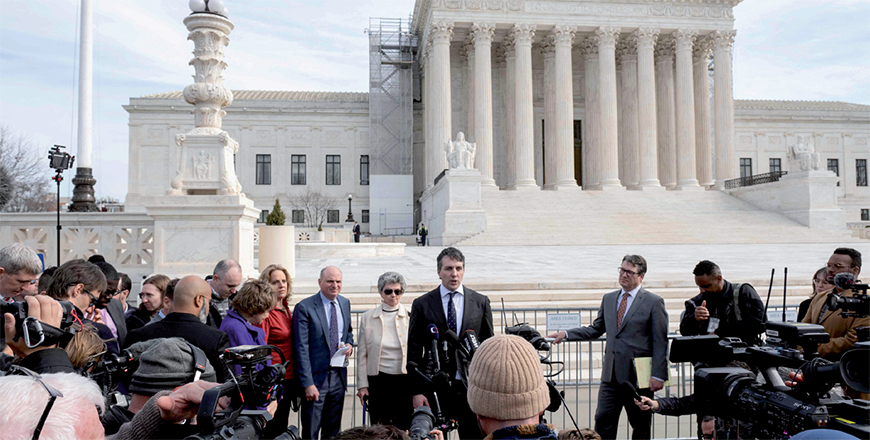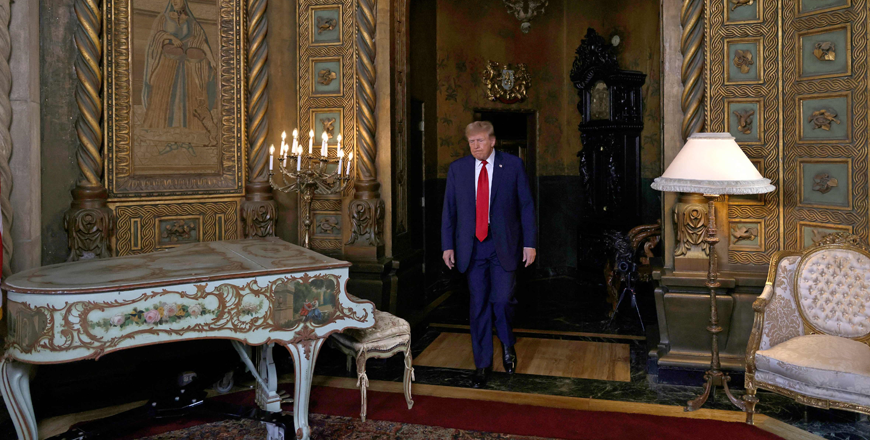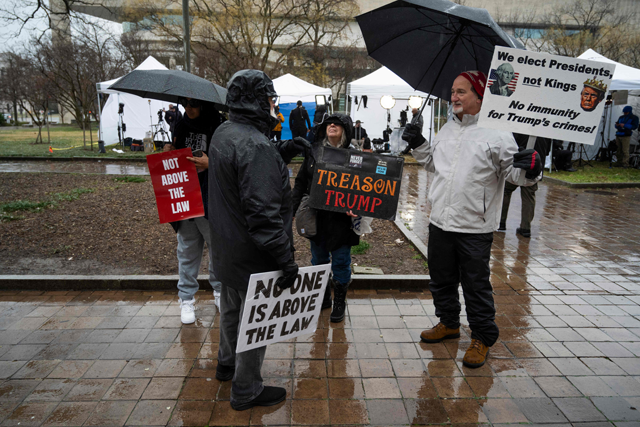You are here
US Supreme Court sceptical of keeping Trump off the ballot
By AFP - Feb 09,2024 - Last updated at Feb 09,2024

Jason Murray, the lead attorney for the Colorado voters speaks to members of the media in front of the US Supreme Court following oral arguments on former US President Donald Trump challenge to a Colorado court ruling barring him from the State’s primary ballot based on the 14th Amendment’s insurrection ban in Washington, DC, on Thursday (AFP photo)
WASHINGTON — A majority of justices on the US Supreme Court appeared to be leaning on Thursday towards rejecting a ruling by a state court that would bar Donald Trump from running for president again.
During two hours of high-stakes arguments, both conservative and liberal members of the nation’s highest court expressed concern about having states decide individually which candidates can be on the presidential ballot this November.
The question before the nine justices was whether Trump is ineligible to appear on the Republican presidential primary ballot in the state of Colorado because he engaged in an insurrection — the January 6, 2021 assault on the US Capitol by his supporters.
Colorado’s Supreme Court, citing the 14th Amendment to the US Constitution, ruled in December that Trump, the frontrunner for the 2024 Republican nomination, should be barred from appearing on the ballot because of his role on January 6.
It is most consequential election law case to feature in the nation’s highest court since it halted the Florida vote recount in 2000 with Republican George W. Bush narrowly leading Democrat Al Gore.
Jonathan Mitchell, a former solicitor general of Texas representing Trump, opened the oral arguments and said only Congress can disqualify a candidate.
“The Colorado Supreme Court’s decision is wrong and should be reversed,” Mitchell said, adding that it would “take away the votes of potentially tens of millions of Americans”.
Jason Murry, representing the Colorado voters who brought the case, countered that Trump should be disqualified under Section 3 of the 14th Amendment.
Section 3 of the 14th Amendment bars anyone from holding public office if they engaged in “insurrection or rebellion” after once pledging to support and defend the Constitution.
The amendment, ratified in 1868 after the Civil War, was aimed at preventing supporters of the slave-holding breakaway Confederacy from being elected to Congress or from holding federal positions.
Trump, speaking to reporters in Florida, said he’d followed the court hearing and that he hoped for a ruling in his favor.
Pointing out his dominance in Republican opinion polls, he said: “Can you take the person that’s leading everywhere and say, ‘Hey, we’re not gonna let you run?’ You know, I think that’s pretty tough to do, but I’m leaving it up to the Supreme Court.”
Chief Justice John Roberts, a conservative, expressed concern over what he called the “daunting consequence” of upholding the state court ruling.
“If Colorado’s position is upheld, surely there will be disqualification proceedings on the other side,” Roberts said. “I would expect that a goodly number of states will say ‘Whoever the Democratic candidate is, you’re off the ballot.’
“It will come down to just a handful of states that are going to decide the presidential election,” he said.
Justice Elena Kagan, a liberal, and several other justices, three of whom were nominated by Trump, appeared to be skeptical about leaving ballot questions to individual states.
“I think that the question that you have to confront is why a single state should decide who gets to be president of the United States?” Kagan told Murray. “Why should a single state have the ability to make this determination not only for their own citizens but for the rest of the nation?”
“Different states can have different procedures,” Murray replied. “Some states may allow insurrectionists to be on the ballot.”
Justice Brett Kavanaugh, a conservative, questioned the impact on democracy of disqualifying the 77-year-old Trump. “Your position has the effect of disenfranchising voters to a significant degree,” he said.
“The reason we’re here is that President Trump tried to disenfranchise 80 million Americans who voted against him and the Constitution doesn’t require that he be given another chance,” Murray replied.
About 20 demonstrators, some carrying signs reading “Trump Is a Traitor” and “Remove Trump”, protested outside the court ahead of the hearing.
The high court has been traditionally loath to get involved in contentious political questions, but it finds itself taking center stage this year in the White House race.
Besides the Colorado case, the Supreme Court may also agree to hear an appeal by Trump of a lower court ruling that he does not enjoy immunity from criminal prosecution as a former president and can be tried on charges of conspiring to overturn the 2020 election.
Trump was impeached by the Democratic-majority House of Representatives for inciting an insurrection but was acquitted by the Senate.
Related Articles
WASHINGTON — The US Supreme Court on Monday removed a potential hurdle to Donald Trump’s bid to recapture the White House, unanimously dismi
WASHINGTON — A panel of US appeals court judges appeared sceptical on Tuesday of Donald Trump’s claim that as a former president he should b
WASHINGTON — In a somber and hushed Senate chamber, Democrats began presenting their opening arguments in the impeachment trial of President

















